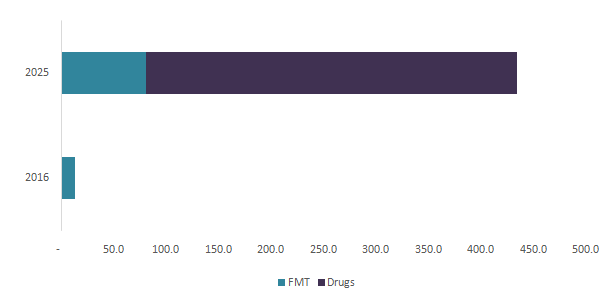Microbiome Therapeutics Market: Commercialization Of Strong Pipeline Will Accentuate Growth
"Dysbiosis, one problem leading to many"
Microbiota is set of symbiotic, commensal, pathogenic organisms living in an ecosystem. Microbiome is a collective genome of such microbiota. The human body consists of microbiota in areas such as gut, skin, vagina, and scalp. The microbes generally do not cause problem or disease until they outgrow the nonpathogenic useful microorganisms. Such type of microbial imbalance or alteration is known as dysbiosis.
The health of digestive tract depends on the symbiotic behavior of these microbes. With bacteria weighing more than 4lbs, gastrointestinal tract is known to have more microbes than other cells in a human body. Dysbiosis or dysbacteriosis of gut flora has been reported as root cause of various disorders by scientists, some of which are gastrointestinal disorders, diabetes, obesity, infectious diseases, arthritis, and metabolic disorders.
Heavy and long-term dose of antibiotics leads to decrease in number of beneficial microorganisms, ultimately resulting in diseased condition. The problem of dysbiosis has been ignored for a long time, until the Human Microbiome Project was launched a few years back, giving momentum to research in this sector.
Microbiome therapeutics type market, 2016 & 2025 (USD Million)

"Effective biological drugs targeting dysbiosis will be a boon"
Emerging research with advancement in technologies pertinent to drug discovery and development has led to emergence of novel microbiome therapeutics pipeline with over10% drugs in phase 2 studies. Fecal Microbial Technology (FMT) is the most promising therapy, as of today. It includes transfer of beneficial microbes from a healthy individual to a patient with dysbiosis. The therapy has been used since the early 90s and was approved by the U.S. FDA as Investigational New Drug (IND) for treatment of C.difficile infections.
The first drug in the drug segment is estimated to witness commercialization at the end of 2017 with good market penetration. The pipeline is small as there are only few drugs, but is strong owing to investigation of same drug for various indications. Most investigated applications are infectious and pathogenic diseases followed by gastrointestinal disorders, such as ulcerative colitis and Crohn’s disease. Few drugs are being studied for diabetes, lactose intolerance, and nervous system disorders. Back-to-back commercialization of drugs after 2017 is expected to provide the market with lucrative growth potential.
"Lucrative competitive landscape"
Investment for development of new drugs is the highest growth rendering factor for this market. Market players such as Seres Therapeutics; ENTEROME Bioscience; Rebiotix, Inc.; and Eligo Bioscience have received a good amount of funding in the past for supporting their microbiome therapeutic research. Companies are focusing on development of therapeutics for untapped applications by collaborating with academic and research institutes. For instance, in August 2016,Vedanta Biosciences made an announcement of its collaboration with the NYU Langone Medical Center for developing microbiome therapies for cancer.
 In-depth report on global microbiome therapeutics market by Grand View Research:
In-depth report on global microbiome therapeutics market by Grand View Research:
https://www.grandviewresearch.com/industry-analysis/microbiome-therapeutics-market